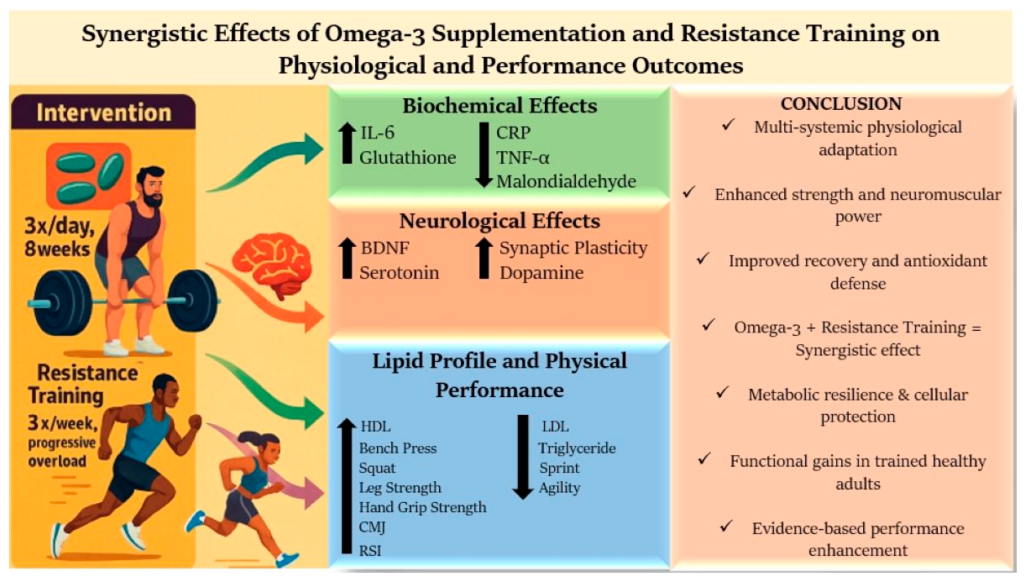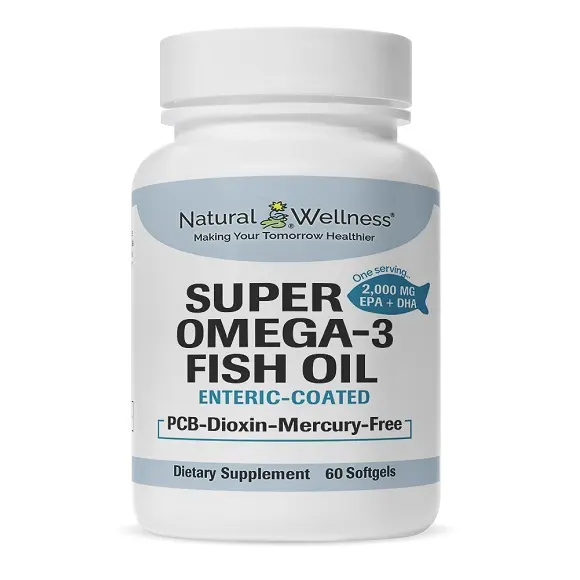Omega-3 fatty acids have long been praised for their heart and brain health benefits—but could they also aid in muscle performance and recovery during strength training?
A recent randomized controlled trial published in the peer-reviewed journal Nutrients investigated the combined effects of omega-3 supplementation and resistance training on lipid profiles, inflammation, antioxidant defenses, and physical performance in healthy adults.
Study Overview
- Participants: 34 healthy, physically active men, aged 20 to 35
- Design: 10-week randomized, double-blind, placebo-controlled trial
- Groups:
-
- Omega-3 group (received 3g/day of fish oil: 1,800 mg EPA + 1,200 mg DHA)
- Placebo group (received 3g/day of sunflower oil)
- Intervention: All participants completed a progressive full-body resistance training program, three times per week
- Measurements: Blood samples and performance tests were taken at baseline and after the intervention to assess:
- Lipid profile (total cholesterol, HDL, LDL, triglycerides)
- Inflammatory markers (TNF-α, IL-6, C-reactive protein)
- Antioxidant capacity (total antioxidant capacity, MDA levels)
- Physical performance (muscle strength and power tests)
Key Findings
1. Inflammation Decreased with Omega-3
Participants who took omega-3 showed a significant reduction in pro-inflammatory markers, particularly IL-6 and C-reactive protein (CRP), compared to baseline.
2. Improved Antioxidant Status
The omega-3 group also experienced enhanced total antioxidant capacity and reduced oxidative stress, which may help combat cellular damage caused by intense training.
3. Better Lipid Profiles
The omega-3 group showed improvements in blood lipids, including reductions in triglycerides and LDL cholesterol, while HDL cholesterol levels increased.
4. Increased Physical Performance
While both groups improved due to training, the omega-3 group demonstrated slightly greater gains in neuromuscular performance metrics—particularly in upper-body strength tests.
Interpretation: Synergy Between Fish Oil and Training
This study adds to the growing body of evidence suggesting that omega-3 fatty acids can enhance the physiological adaptations to exercise, especially by:
- Reducing systemic inflammation
- Enhancing antioxidant defenses
- Supporting healthy blood lipid levels
- Modestly improving strength performance
Omega-3s may act as a supportive tool for active individuals aiming to optimize recovery and maintain long-term cardiovascular and joint health.

Takeaways for Active Adults
- Faster recovery from exercise-induced inflammation
- Protection against oxidative stress
- Heart-healthy lipid improvements
- Potential for slightly better strength outcomes
The study used 3 grams/day of fish oil providing 1.8 g EPA and 1.2 g DHA. Before adding any supplement, it’s best to consult with a healthcare provider.
Final Thoughts
While omega-3 supplements alone won’t turn you into a powerlifter, this research suggests they may give your training a performance and recovery edge. For athletes and fitness enthusiasts alike, combining consistent resistance training with targeted nutritional support—like omega-3s—could be a smart strategy for long-term gains and wellness.
Citation:
Looking for a High-Quality Omega-3 Supplement?
If you’re considering adding omega-3s to your routine, it’s important to choose a product that delivers effective doses of EPA and DHA in a purified, easily absorbed form.
 Our Super Omega-3 Fish Oil provides 2,000 mg of fish oil concentrate per serving—including 600 mg of EPA and 400 mg of DHA—sourced from premium fish oil and tested for purity and potency.
Our Super Omega-3 Fish Oil provides 2,000 mg of fish oil concentrate per serving—including 600 mg of EPA and 400 mg of DHA—sourced from premium fish oil and tested for purity and potency.
- Supports heart, brain, joint, and immune health
- Helps combat exercise-related inflammation
- No fishy aftertaste thanks to enteric coating
- Manufactured to the highest quality standards
Whether you’re active, health-conscious, or simply looking to maintain overall wellness, Super Omega-3 is a smart addition to your daily regimen.
Please rewrite this sentence for me.


